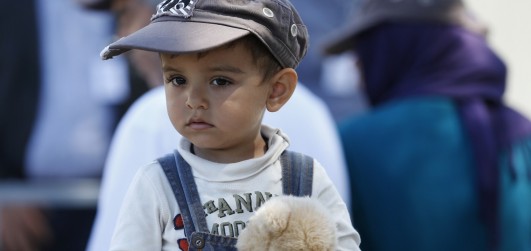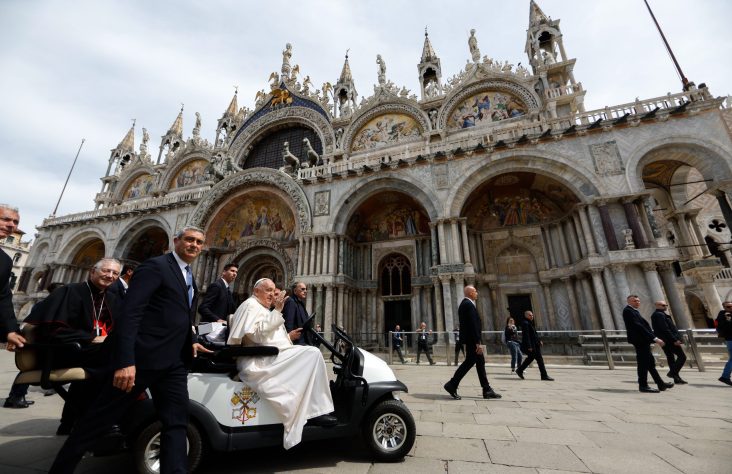April 20, 2016 // Uncategorized
Pope prays for refugees, brings 12 Syrians back to Rome

A boy holds his teddy bear as Pope Francis leads a meeting with refugees at the Moria refugee camp on the island of Lesbos, Greece, April 16, 2016.
MYTILENE, Greece (CNS) — Pope Francis’ five-hour visit to Greece ended with him offering safe passage to Italy to 12 Syrian Muslims, half under the age of 18.
The Vatican had kept secret the pope’s plan to invite the members of three Syrian families to fly back to Rome with him April 16. Rumors began swirling in the Greek media a couple hours before the flight took off, but it was confirmed by the Vatican only as the 12 were boarding the papal plane.
The Vatican Secretariat of State made formal arrangements with the Italy and the Greek governments to obtain the legal permits needed for the refugees to live in Italy, a Vatican statement said. The Vatican will assume financial responsibility for the families, who will be assisted by the Rome-based Community of Sant’Egidio.
All 12 in the group, the Vatican added, had arrived in Greece prior to March 20, the date a European Union agreement with Turkey went into effect for returning most asylum seekers to Turkey. The children are between the ages of 2 and 17.
After spending the morning with desperate refugees interned in a camp in Greece, Pope Francis and Orthodox leaders turned their attention and prayers to the sea, the final burial place of hundreds who died trying to get to Europe.
Just since January, the International Organization for Migration said, more than 150,000 migrants and refugees arrived in Greece and 366 people died attempting crossing the Aegean Sea to the country.
“Though many of their graves bear no name, to you each one is know, loved and cherished,” Pope Francis prayed to God April 16 in Mytilene, a city on Lesbos, the island on which more than half the refugees have landed.
“Wake us from the slumber of indifference,” the pope prayed, “open our eyes to their suffering and free us from the insensitivity born of world comfort and self-centeredness.”
In his prayer, Pope Francis insisted “we are all migrants, journeying in hope” toward God in heaven.
Orthodox Ecumenical Patriarch Bartholomew of Constantinople and Archbishop Ieronymos II of Athens and all Greece stood alongside Pope Francis on the waterfront at the Mytilene harbor on the bright spring day. They, too, offered prayers for those who have died making the crossing and joined the pope in blessing laurel wreaths that were tossed into the sea.
Recognizing the generosity and sacrifice of the Greek government and Greek people, who had tried to assist hundreds of thousands of refugees despite an ongoing economic crisis, the pope told them, “You are guardians of humanity for you care with tenderness for the body of Christ, who suffers in the least of his brothers and sisters, the hungry and the stranger, whom you have welcomed.”
With hundreds of thousands of people fleeing violence in Syria and Iraq and fleeing extreme poverty and persecution elsewhere, Pope Francis acknowledged that Europeans and their governments naturally could feel overwhelmed. The fact that the newcomers speak different languages and have different religions and cultures adds to the challenge.
But the migrants “are living in trying conditions, in an atmosphere of anxiety and fear, at times even of despair, due to material hardship and uncertainty for the future,” the pope said.
While the concerns of governments are “understandable and legitimate,” he said, one must never forget that “migrants, rather than simply being a statistic, are first of all persons who have faces, names and individual stories.”
Greece, and to a lesser extent Italy, are on the frontlines of the refugee influx and are forced to bear much of the burden for welcoming, housing and screening them as other European countries close their borders or make entry difficult.
Pope Francis, though, called on Europe to live up to its claim of being “the homeland of human rights.”
“Whoever sets foot on European soil ought to sense this, and thus become more aware of the duty to respect and defend those rights,” the pope said.
He praised the people of Lesbos for showing that “in these lands, the cradle of civilization, the heart of humanity continues to beat; a humanity that before all else recognizes others as brothers and sisters, a humanity that wants to build bridges and recoils from the idea of putting up walls to make us feel safer. In reality, barriers create divisions instead of promoting the true progress of peoples, and divisions sooner or later lead to confrontations.”
__________
‘It makes you weep,’ pope says of refugees’ stories
ABOARD THE PAPAL FLIGHT FROM GREECE (CNS) — When an aide suggested Pope Francis offer to fly some Syrian refugees back to Rome with him, the pope said he agreed immediately because it was “an inspiration of the Holy Spirit.”
In the end, he said, 12 Syrians — members of three families, including six children — had all the necessary papers from the Greek and Italian governments in time to fly with the pope April 16.
The fact that the 12 are all Muslims did not enter into the equation, the pope said. “I gave priority to children of God.”
Two Christian families originally had been on the Vatican’s list, too, he said, but their papers were not ready in time.
Spending about half an hour answering reporters’ questions, Pope Francis insisted his visit to Greece with Orthodox leaders was not about criticizing a recent agreement between the European Union and Turkey to return to Turkey those entering EU territory without legal permission.
“What I saw today and what you saw in that refugee camp — it makes you weep,” the pope told reporters.
“Look what I brought to show you,” the pope told them. He held up some of the drawings the children in the camp had given him. “Look at this,” he said, “this one saw a child drown.”
“Really, today is a day to weep,” he said. Holding up another picture, he pointed to the top and said, “The sun is crying. If the sun is able to cry, we should be able to shed at least one tear” for those children who will carry the memory of suffering with them.
Asked specifically about immigration to the United States and how it relates to what he had called a “catastrophe,” Pope Francis insisted “it’s a global problem” and that Central Americans fleeing poverty and violence also deserve the world’s concern and assistance.
On other questions during the inflight news conference:
— Pope Francis confirmed he had met U.S. Senator Bernie Sanders that morning as the pope was leaving his residence. Sanders and other participants at a Vatican conference were staying in the Domus Sanctae Marthae, where the pope lives.
“It was polite” for Sanders, who knew when the pope was leaving, to go downstairs to greet him, the pope said. “If someone thinks greeting someone is to get involved in politics, I recommend he see a psychiatrist.”
— The pope was asked to settle the debate about his postsynodal apostolic exhortation on the family and whether the document opened new possibilities for divorced and civilly remarried Catholics to receive Communion under some circumstances.
“I could say, ‘Yes. Period,’ but that would be too short a response,” the pope said. “I recommend everyone read the presentation made by Cardinal (Christoph) Schonborn” at the Vatican news conference presenting the document. The cardinal, archbishop of Vienna, had said the document represented “true innovations, but no break” with church tradition.
Still, the pope said, much of the news media focused so much on the question of Communion for the divorced that they skewed the public’s perception of the 2014 and 2015 meetings of the Synod of Bishops.
“Since I’m not a saint, this annoyed me and then saddened me,” the pope said. “Don’t they understand that the family throughout the world is in crisis?”
“The family is the foundation of society,” Pope Francis said. The great problems include a reluctance by young people to marry, extremely low birth rates in Europe, unemployment, poverty — “those are the big problems.”
The best news. Delivered to your inbox.
Subscribe to our mailing list today.





